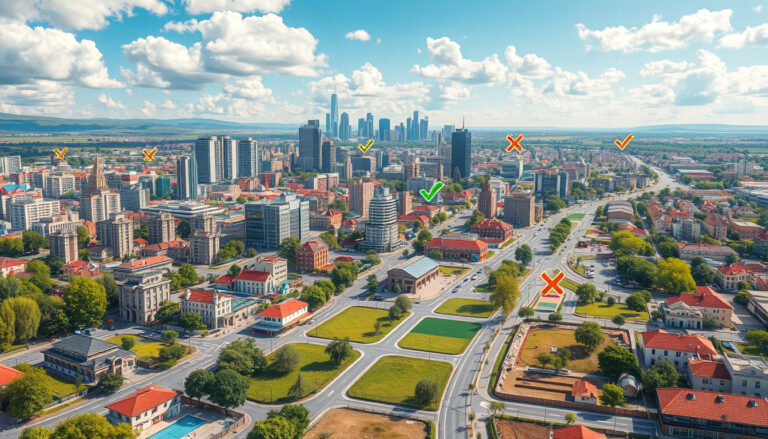In an increasingly bustling world, the allure of rural property locations is becoming more pronounced.
Many are seeking the serenity, space, and natural beauty that these areas offer.
Whether you’re looking to escape the fast-paced city life, invest in real estate, or find a place for a peaceful retreat, understanding the nuances of selecting a rural property location is essential.
This guide will delve into the many benefits of rural living, outline key considerations for choosing the ideal property, and provide tips to ensure you find your perfect slice of tranquility.


Researching Local Amenities and Services
When exploring Costa Rica real estate, particularly in rural property locations, it’s essential to research local amenities and services that can enhance your living experience.
Understanding the proximity of essential resources such as grocery stores, healthcare facilities, schools, and recreational activities can significantly impact your decision-making process.
In many rural areas, you might find charming local markets and close-knit community services that cater to residents’ needs while offering a taste of authentic Costa Rican life.
Furthermore, consider transportation options and accessibility to larger towns, as these factors will influence not only your daily routines but also the potential resale value of your rural property.
By thoroughly investigating the local amenities and services available in your chosen area, you can make a more informed decision and ensure that your investment in Costa Rica real estate meets your lifestyle requirements.
Assessing Land Characteristics and Surroundings
When considering purchasing rural property in Costa Rica, one of the most critical aspects to assess is the land characteristics and surroundings.
This evaluation goes beyond merely examining the physical terrain; it involves understanding the environmental, social, and geographical aspects that will affect your investment.
Start by looking at the topography of the land, as it plays a significant role in everything from access to utilities to potential agricultural uses.
Additionally, the proximity to essential amenities such as schools, hospitals, and grocery stores can impact your lifestyle and property value.
Consider the nearby infrastructure, including roads and public transport, as well as the area’s climate and natural resources.
For those interested in a rural property location, it’s also wise to research zoning laws and land use regulations, as these can influence future developments and restrictions.
Overall, a comprehensive assessment will equip you with the knowledge necessary to make an informed and strategic investment in Costa Rica’s vibrant rural real estate market.

Exploring Zoning Regulations and Future Developments
When considering a rural property location in Costa Rica, understanding the local zoning regulations and potential future developments is crucial for both investors and buyers.
The country is known for its diverse landscapes, ranging from lush jungles to stunning beaches, attracting those looking to escape city life.
However, each region operates under specific zoning laws that dictate what types of constructions are permissible, affecting your investment potential and the overall value of the property.
For example, areas designated for agricultural use may have restrictions on building residential properties.
Furthermore, researching upcoming developments can provide insights into the area’s growth trajectory and economic viability, ensuring that your investment in rural Costa Rica not only provides a tranquil retreat but also offers strong appreciation potential.
Engaging with local real estate experts can help navigate these complexities, making your journey in acquiring rural property in Costa Rica both seamless and rewarding.
Tips for Visiting and Evaluating Potential Properties
When exploring the enchanting landscapes of Costa Rica, evaluating potential Rural property locations is crucial for making a wise investment in real estate.
Begin by researching different regions, such as the Central Valley, Guanacaste, and the Southern Zone, each offering unique benefits depending on your lifestyle preferences.
It’s advisable to visit various areas in person to understand the local culture and amenities, examine the accessibility of essential services, and gauge the overall atmosphere.
Take note of factors like climate, proximity to beaches, and the level of tourist activity, as these can influence both your enjoyment of the property and its future resale value.
Engaging with local real estate professionals can also provide invaluable insights and help you navigate the intricacies of buying real estate in this tropical paradise.
Remember to pay attention to zoning regulations and environmental considerations, which can affect your property investment and development potential in the long run.
Frequently Asked Questions
What are the benefits of rural living?
Rural living offers numerous benefits, including tranquility, ample space, a closer connection to nature, lower cost of living, and the opportunity for a tight-knit community.
Additionally, rural areas often provide less noise and pollution compared to urban settings.
What key factors should I consider when choosing a rural property location?
When selecting a rural property, consider proximity to essential services, the availability of natural resources, local climate, access to transportation routes, and the surrounding community culture.
Also, evaluate future development plans that may impact the area.
How can I research local amenities and services when looking for a rural property?
Research local amenities by using online resources, community websites, or visiting the area.
Look for schools, healthcare facilities, grocery stores, and recreational options.
Engaging with locals and real estate agents can also provide insight into available services.
What should I examine regarding land characteristics when evaluating rural property?
Assess land characteristics such as topography, soil quality, water availability, and natural features like trees, ponds, or streams.
Consider the land’s usability for your needs, whether for agriculture, recreation, or building a home.
What are zoning regulations and why are they important when buying rural property?
Zoning regulations dictate how land can be used and developed.
It’s crucial to understand these regulations as they affect building codes, land use, and development rights.
Research local zoning laws to ensure your intended use aligns with what is permitted.





